Organisational Behaviour Report: BBC Culture, Power, Motivation
VerifiedAdded on 2021/02/21
|15
|4911
|68
Report
AI Summary
This report presents an analysis of organizational behavior, focusing on the British Broadcasting Corporation (BBC). It examines the influence of culture, power, and politics on individual and team behavior, utilizing Handy's culture model and French and Raven's power model. The report evaluates motivation theories, including content and process theories, and explores motivational techniques for effective goal achievement within the organization. It also discusses the characteristics of effective and ineffective teams, applying the Tuckman model to understand team dynamics. Furthermore, the report applies organizational behavior concepts to the BBC's context and offers recommendations for improving employee performance, emphasizing team building and positive organizational behavior, including the application of path-goal theory. The report highlights the importance of reward power, team building, and creating a positive work environment for the employees. The report also covers the role of motivation, content and process theory, and the various forms of a team, and how it helps in forming an effective team.
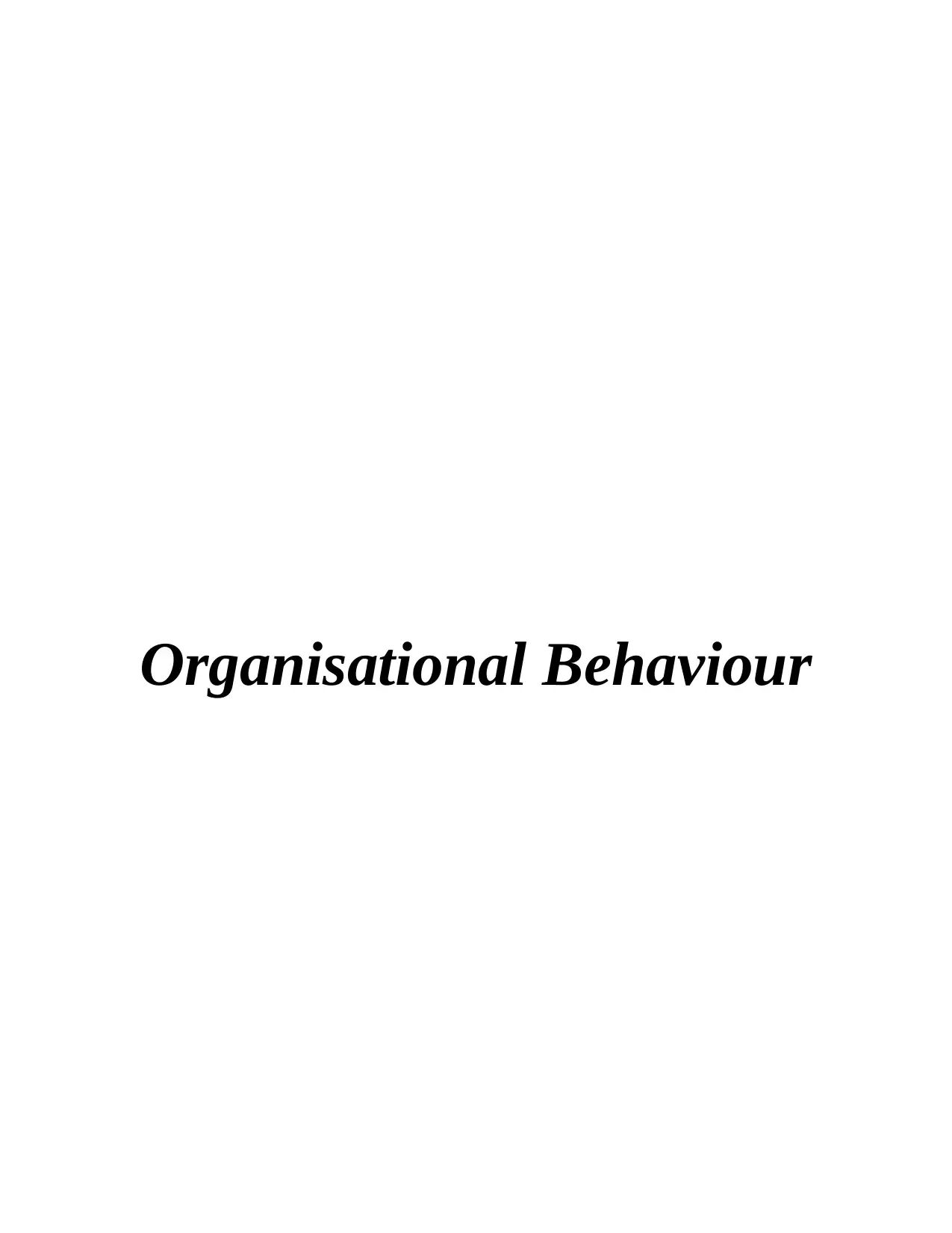
Organisational Behaviour
Paraphrase This Document
Need a fresh take? Get an instant paraphrase of this document with our AI Paraphraser
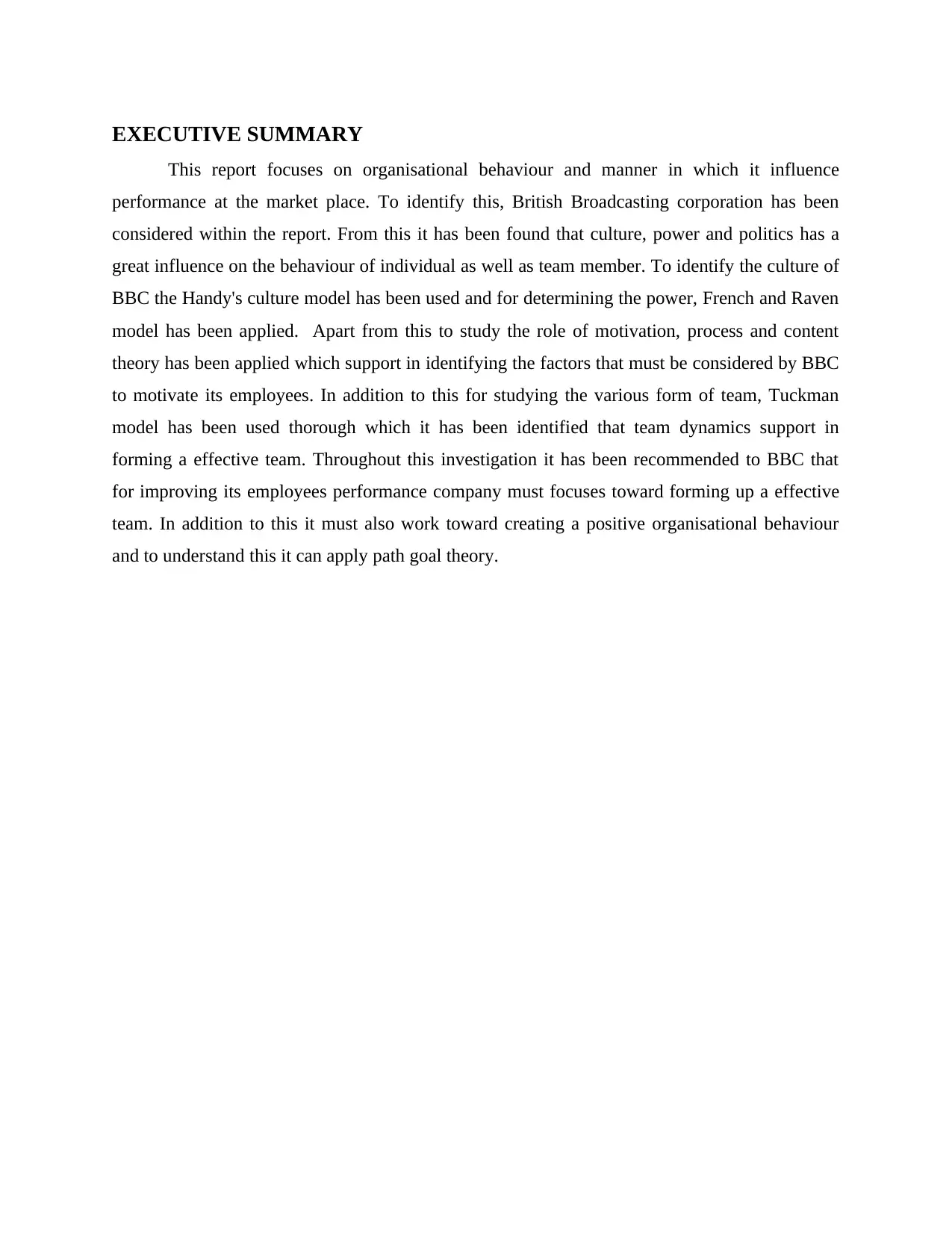
EXECUTIVE SUMMARY
This report focuses on organisational behaviour and manner in which it influence
performance at the market place. To identify this, British Broadcasting corporation has been
considered within the report. From this it has been found that culture, power and politics has a
great influence on the behaviour of individual as well as team member. To identify the culture of
BBC the Handy's culture model has been used and for determining the power, French and Raven
model has been applied. Apart from this to study the role of motivation, process and content
theory has been applied which support in identifying the factors that must be considered by BBC
to motivate its employees. In addition to this for studying the various form of team, Tuckman
model has been used thorough which it has been identified that team dynamics support in
forming a effective team. Throughout this investigation it has been recommended to BBC that
for improving its employees performance company must focuses toward forming up a effective
team. In addition to this it must also work toward creating a positive organisational behaviour
and to understand this it can apply path goal theory.
This report focuses on organisational behaviour and manner in which it influence
performance at the market place. To identify this, British Broadcasting corporation has been
considered within the report. From this it has been found that culture, power and politics has a
great influence on the behaviour of individual as well as team member. To identify the culture of
BBC the Handy's culture model has been used and for determining the power, French and Raven
model has been applied. Apart from this to study the role of motivation, process and content
theory has been applied which support in identifying the factors that must be considered by BBC
to motivate its employees. In addition to this for studying the various form of team, Tuckman
model has been used thorough which it has been identified that team dynamics support in
forming a effective team. Throughout this investigation it has been recommended to BBC that
for improving its employees performance company must focuses toward forming up a effective
team. In addition to this it must also work toward creating a positive organisational behaviour
and to understand this it can apply path goal theory.
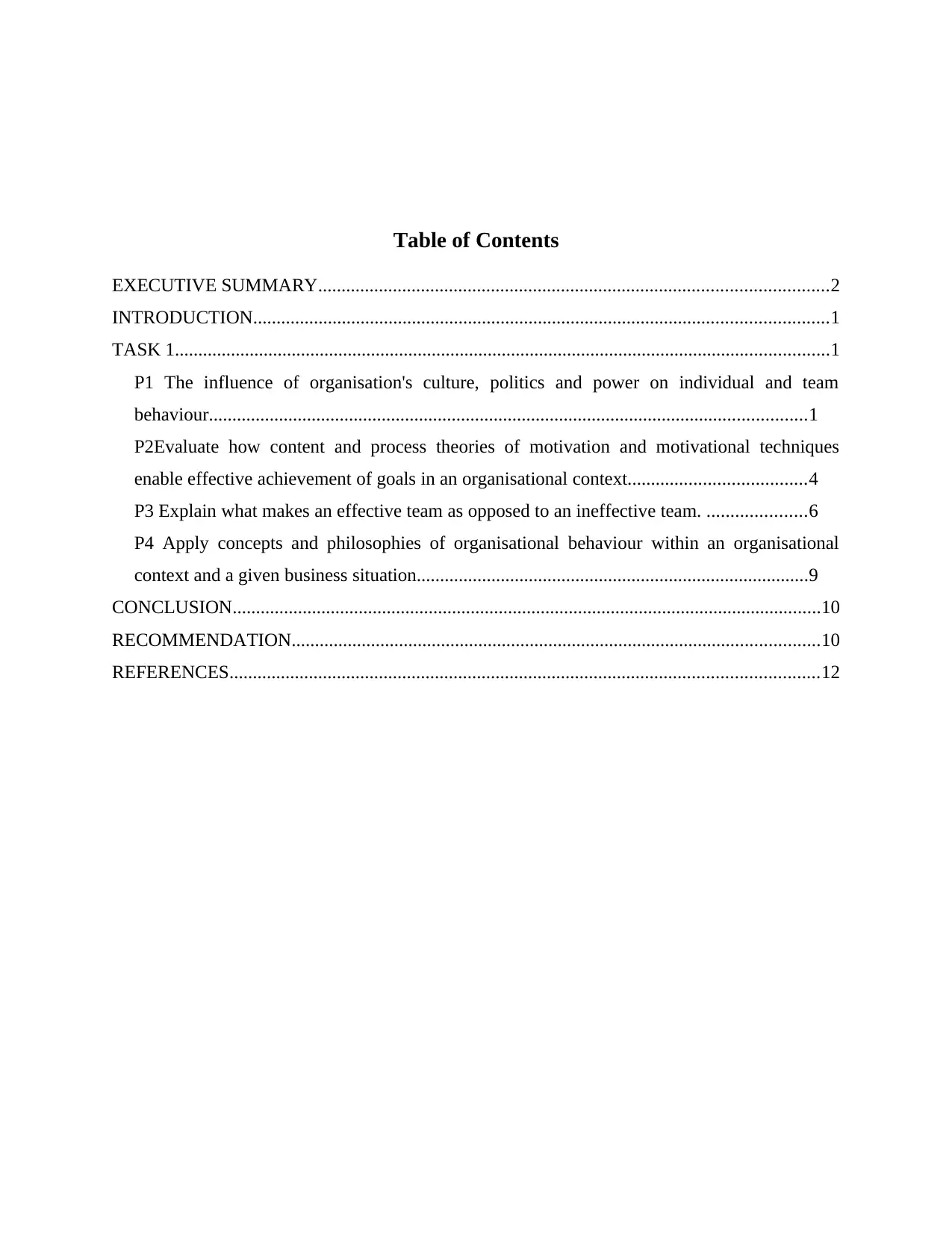
Table of Contents
EXECUTIVE SUMMARY.............................................................................................................2
INTRODUCTION...........................................................................................................................1
TASK 1............................................................................................................................................1
P1 The influence of organisation's culture, politics and power on individual and team
behaviour................................................................................................................................1
P2Evaluate how content and process theories of motivation and motivational techniques
enable effective achievement of goals in an organisational context......................................4
P3 Explain what makes an effective team as opposed to an ineffective team. .....................6
P4 Apply concepts and philosophies of organisational behaviour within an organisational
context and a given business situation....................................................................................9
CONCLUSION..............................................................................................................................10
RECOMMENDATION.................................................................................................................10
REFERENCES..............................................................................................................................12
EXECUTIVE SUMMARY.............................................................................................................2
INTRODUCTION...........................................................................................................................1
TASK 1............................................................................................................................................1
P1 The influence of organisation's culture, politics and power on individual and team
behaviour................................................................................................................................1
P2Evaluate how content and process theories of motivation and motivational techniques
enable effective achievement of goals in an organisational context......................................4
P3 Explain what makes an effective team as opposed to an ineffective team. .....................6
P4 Apply concepts and philosophies of organisational behaviour within an organisational
context and a given business situation....................................................................................9
CONCLUSION..............................................................................................................................10
RECOMMENDATION.................................................................................................................10
REFERENCES..............................................................................................................................12
⊘ This is a preview!⊘
Do you want full access?
Subscribe today to unlock all pages.

Trusted by 1+ million students worldwide
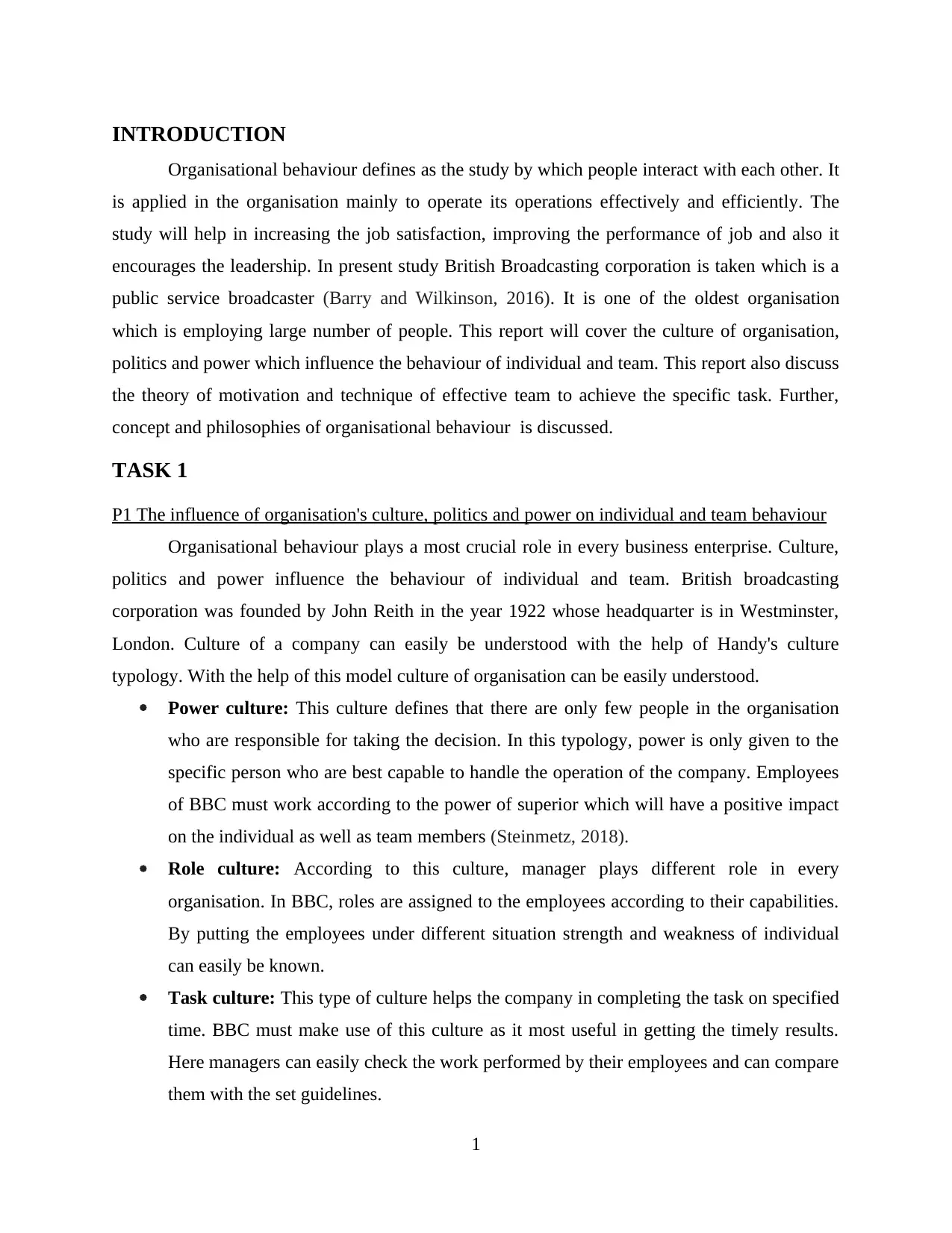
INTRODUCTION
Organisational behaviour defines as the study by which people interact with each other. It
is applied in the organisation mainly to operate its operations effectively and efficiently. The
study will help in increasing the job satisfaction, improving the performance of job and also it
encourages the leadership. In present study British Broadcasting corporation is taken which is a
public service broadcaster (Barry and Wilkinson, 2016). It is one of the oldest organisation
which is employing large number of people. This report will cover the culture of organisation,
politics and power which influence the behaviour of individual and team. This report also discuss
the theory of motivation and technique of effective team to achieve the specific task. Further,
concept and philosophies of organisational behaviour is discussed.
TASK 1
P1 The influence of organisation's culture, politics and power on individual and team behaviour
Organisational behaviour plays a most crucial role in every business enterprise. Culture,
politics and power influence the behaviour of individual and team. British broadcasting
corporation was founded by John Reith in the year 1922 whose headquarter is in Westminster,
London. Culture of a company can easily be understood with the help of Handy's culture
typology. With the help of this model culture of organisation can be easily understood.
Power culture: This culture defines that there are only few people in the organisation
who are responsible for taking the decision. In this typology, power is only given to the
specific person who are best capable to handle the operation of the company. Employees
of BBC must work according to the power of superior which will have a positive impact
on the individual as well as team members (Steinmetz, 2018).
Role culture: According to this culture, manager plays different role in every
organisation. In BBC, roles are assigned to the employees according to their capabilities.
By putting the employees under different situation strength and weakness of individual
can easily be known.
Task culture: This type of culture helps the company in completing the task on specified
time. BBC must make use of this culture as it most useful in getting the timely results.
Here managers can easily check the work performed by their employees and can compare
them with the set guidelines.
1
Organisational behaviour defines as the study by which people interact with each other. It
is applied in the organisation mainly to operate its operations effectively and efficiently. The
study will help in increasing the job satisfaction, improving the performance of job and also it
encourages the leadership. In present study British Broadcasting corporation is taken which is a
public service broadcaster (Barry and Wilkinson, 2016). It is one of the oldest organisation
which is employing large number of people. This report will cover the culture of organisation,
politics and power which influence the behaviour of individual and team. This report also discuss
the theory of motivation and technique of effective team to achieve the specific task. Further,
concept and philosophies of organisational behaviour is discussed.
TASK 1
P1 The influence of organisation's culture, politics and power on individual and team behaviour
Organisational behaviour plays a most crucial role in every business enterprise. Culture,
politics and power influence the behaviour of individual and team. British broadcasting
corporation was founded by John Reith in the year 1922 whose headquarter is in Westminster,
London. Culture of a company can easily be understood with the help of Handy's culture
typology. With the help of this model culture of organisation can be easily understood.
Power culture: This culture defines that there are only few people in the organisation
who are responsible for taking the decision. In this typology, power is only given to the
specific person who are best capable to handle the operation of the company. Employees
of BBC must work according to the power of superior which will have a positive impact
on the individual as well as team members (Steinmetz, 2018).
Role culture: According to this culture, manager plays different role in every
organisation. In BBC, roles are assigned to the employees according to their capabilities.
By putting the employees under different situation strength and weakness of individual
can easily be known.
Task culture: This type of culture helps the company in completing the task on specified
time. BBC must make use of this culture as it most useful in getting the timely results.
Here managers can easily check the work performed by their employees and can compare
them with the set guidelines.
1
Paraphrase This Document
Need a fresh take? Get an instant paraphrase of this document with our AI Paraphraser
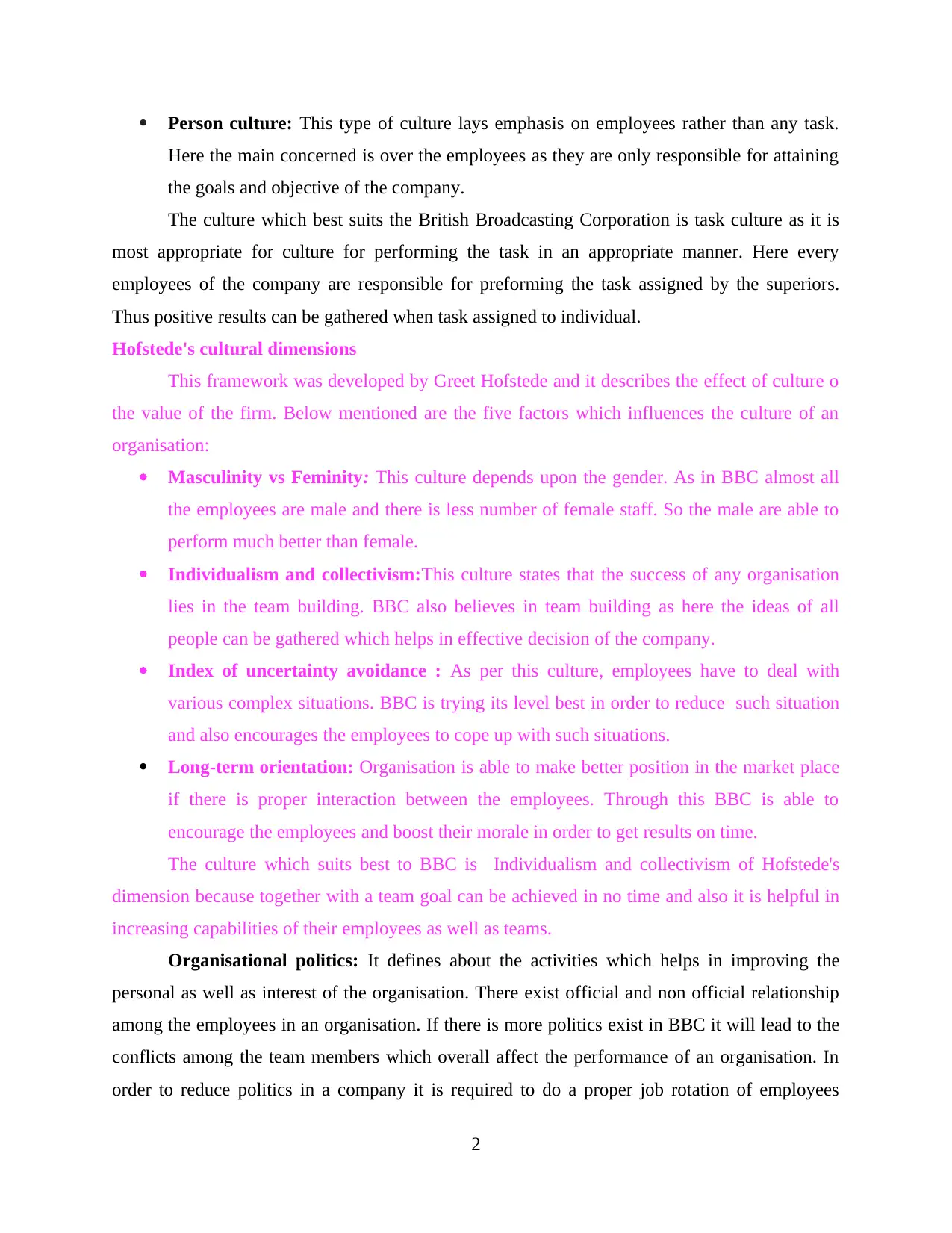
Person culture: This type of culture lays emphasis on employees rather than any task.
Here the main concerned is over the employees as they are only responsible for attaining
the goals and objective of the company.
The culture which best suits the British Broadcasting Corporation is task culture as it is
most appropriate for culture for performing the task in an appropriate manner. Here every
employees of the company are responsible for preforming the task assigned by the superiors.
Thus positive results can be gathered when task assigned to individual.
Hofstede's cultural dimensions
This framework was developed by Greet Hofstede and it describes the effect of culture o
the value of the firm. Below mentioned are the five factors which influences the culture of an
organisation:
Masculinity vs Feminity: This culture depends upon the gender. As in BBC almost all
the employees are male and there is less number of female staff. So the male are able to
perform much better than female.
Individualism and collectivism:This culture states that the success of any organisation
lies in the team building. BBC also believes in team building as here the ideas of all
people can be gathered which helps in effective decision of the company.
Index of uncertainty avoidance : As per this culture, employees have to deal with
various complex situations. BBC is trying its level best in order to reduce such situation
and also encourages the employees to cope up with such situations.
Long-term orientation: Organisation is able to make better position in the market place
if there is proper interaction between the employees. Through this BBC is able to
encourage the employees and boost their morale in order to get results on time.
The culture which suits best to BBC is Individualism and collectivism of Hofstede's
dimension because together with a team goal can be achieved in no time and also it is helpful in
increasing capabilities of their employees as well as teams.
Organisational politics: It defines about the activities which helps in improving the
personal as well as interest of the organisation. There exist official and non official relationship
among the employees in an organisation. If there is more politics exist in BBC it will lead to the
conflicts among the team members which overall affect the performance of an organisation. In
order to reduce politics in a company it is required to do a proper job rotation of employees
2
Here the main concerned is over the employees as they are only responsible for attaining
the goals and objective of the company.
The culture which best suits the British Broadcasting Corporation is task culture as it is
most appropriate for culture for performing the task in an appropriate manner. Here every
employees of the company are responsible for preforming the task assigned by the superiors.
Thus positive results can be gathered when task assigned to individual.
Hofstede's cultural dimensions
This framework was developed by Greet Hofstede and it describes the effect of culture o
the value of the firm. Below mentioned are the five factors which influences the culture of an
organisation:
Masculinity vs Feminity: This culture depends upon the gender. As in BBC almost all
the employees are male and there is less number of female staff. So the male are able to
perform much better than female.
Individualism and collectivism:This culture states that the success of any organisation
lies in the team building. BBC also believes in team building as here the ideas of all
people can be gathered which helps in effective decision of the company.
Index of uncertainty avoidance : As per this culture, employees have to deal with
various complex situations. BBC is trying its level best in order to reduce such situation
and also encourages the employees to cope up with such situations.
Long-term orientation: Organisation is able to make better position in the market place
if there is proper interaction between the employees. Through this BBC is able to
encourage the employees and boost their morale in order to get results on time.
The culture which suits best to BBC is Individualism and collectivism of Hofstede's
dimension because together with a team goal can be achieved in no time and also it is helpful in
increasing capabilities of their employees as well as teams.
Organisational politics: It defines about the activities which helps in improving the
personal as well as interest of the organisation. There exist official and non official relationship
among the employees in an organisation. If there is more politics exist in BBC it will lead to the
conflicts among the team members which overall affect the performance of an organisation. In
order to reduce politics in a company it is required to do a proper job rotation of employees
2
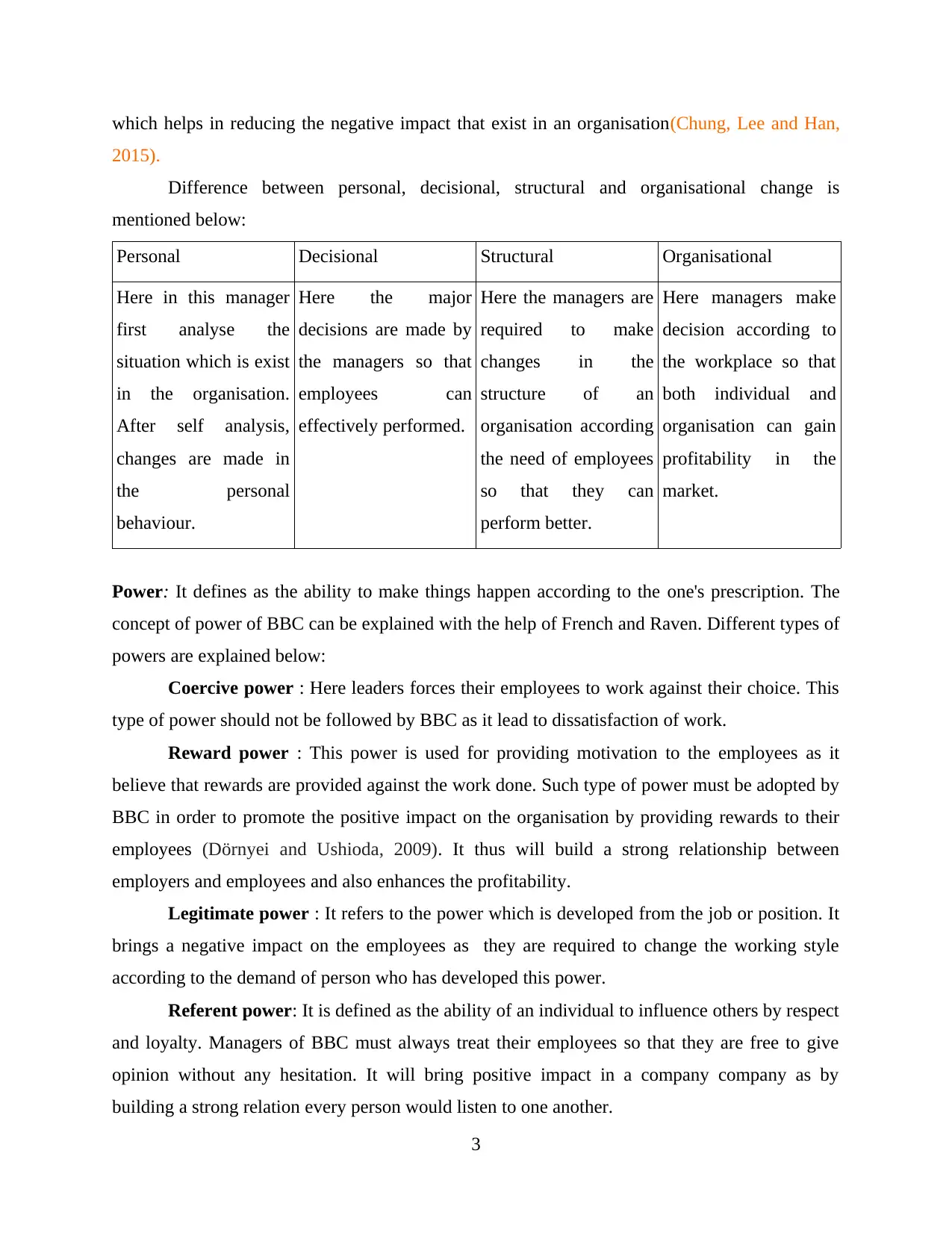
which helps in reducing the negative impact that exist in an organisation(Chung, Lee and Han,
2015).
Difference between personal, decisional, structural and organisational change is
mentioned below:
Personal Decisional Structural Organisational
Here in this manager
first analyse the
situation which is exist
in the organisation.
After self analysis,
changes are made in
the personal
behaviour.
Here the major
decisions are made by
the managers so that
employees can
effectively performed.
Here the managers are
required to make
changes in the
structure of an
organisation according
the need of employees
so that they can
perform better.
Here managers make
decision according to
the workplace so that
both individual and
organisation can gain
profitability in the
market.
Power: It defines as the ability to make things happen according to the one's prescription. The
concept of power of BBC can be explained with the help of French and Raven. Different types of
powers are explained below:
Coercive power : Here leaders forces their employees to work against their choice. This
type of power should not be followed by BBC as it lead to dissatisfaction of work.
Reward power : This power is used for providing motivation to the employees as it
believe that rewards are provided against the work done. Such type of power must be adopted by
BBC in order to promote the positive impact on the organisation by providing rewards to their
employees (Dörnyei and Ushioda, 2009). It thus will build a strong relationship between
employers and employees and also enhances the profitability.
Legitimate power : It refers to the power which is developed from the job or position. It
brings a negative impact on the employees as they are required to change the working style
according to the demand of person who has developed this power.
Referent power: It is defined as the ability of an individual to influence others by respect
and loyalty. Managers of BBC must always treat their employees so that they are free to give
opinion without any hesitation. It will bring positive impact in a company company as by
building a strong relation every person would listen to one another.
3
2015).
Difference between personal, decisional, structural and organisational change is
mentioned below:
Personal Decisional Structural Organisational
Here in this manager
first analyse the
situation which is exist
in the organisation.
After self analysis,
changes are made in
the personal
behaviour.
Here the major
decisions are made by
the managers so that
employees can
effectively performed.
Here the managers are
required to make
changes in the
structure of an
organisation according
the need of employees
so that they can
perform better.
Here managers make
decision according to
the workplace so that
both individual and
organisation can gain
profitability in the
market.
Power: It defines as the ability to make things happen according to the one's prescription. The
concept of power of BBC can be explained with the help of French and Raven. Different types of
powers are explained below:
Coercive power : Here leaders forces their employees to work against their choice. This
type of power should not be followed by BBC as it lead to dissatisfaction of work.
Reward power : This power is used for providing motivation to the employees as it
believe that rewards are provided against the work done. Such type of power must be adopted by
BBC in order to promote the positive impact on the organisation by providing rewards to their
employees (Dörnyei and Ushioda, 2009). It thus will build a strong relationship between
employers and employees and also enhances the profitability.
Legitimate power : It refers to the power which is developed from the job or position. It
brings a negative impact on the employees as they are required to change the working style
according to the demand of person who has developed this power.
Referent power: It is defined as the ability of an individual to influence others by respect
and loyalty. Managers of BBC must always treat their employees so that they are free to give
opinion without any hesitation. It will bring positive impact in a company company as by
building a strong relation every person would listen to one another.
3
⊘ This is a preview!⊘
Do you want full access?
Subscribe today to unlock all pages.

Trusted by 1+ million students worldwide
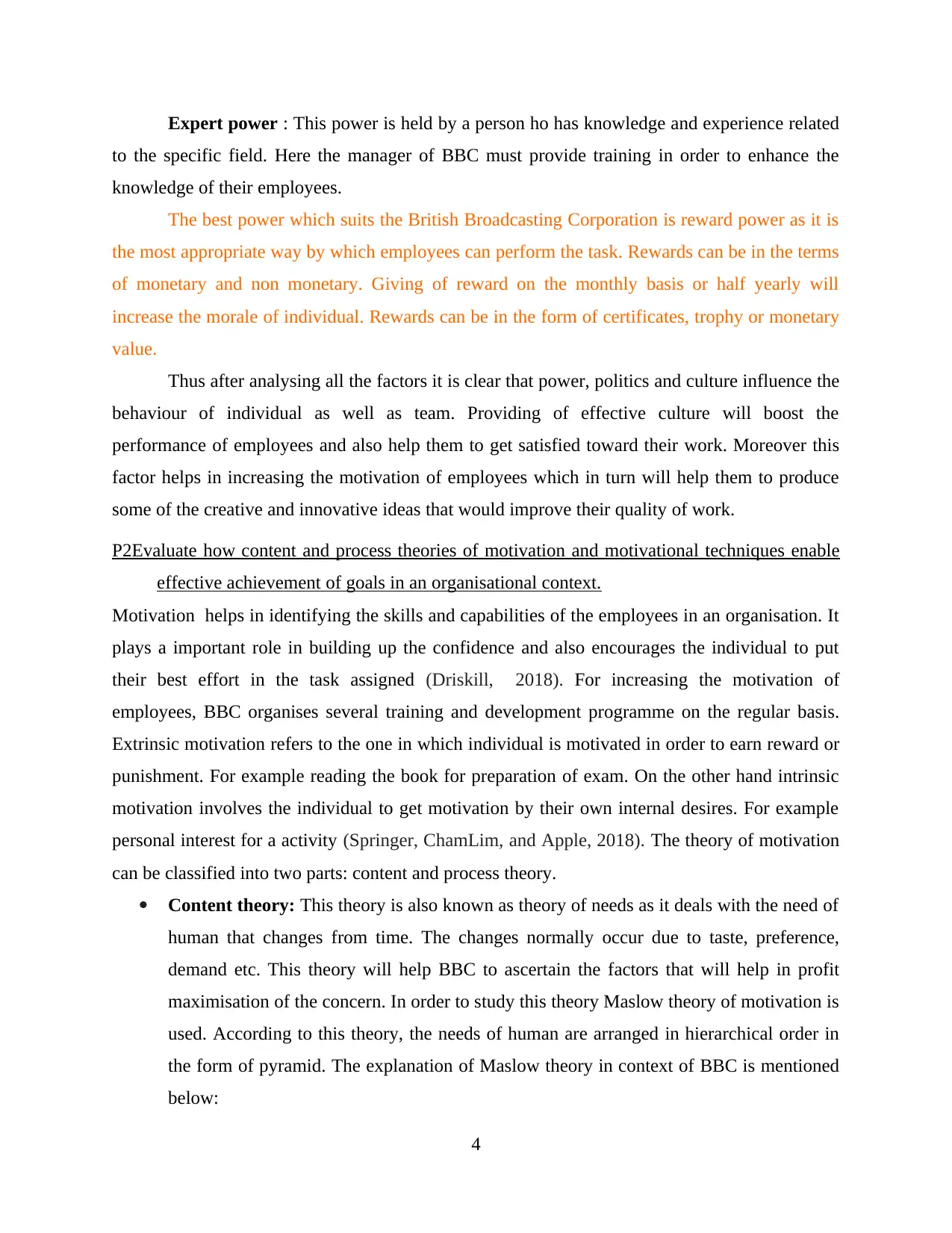
Expert power : This power is held by a person ho has knowledge and experience related
to the specific field. Here the manager of BBC must provide training in order to enhance the
knowledge of their employees.
The best power which suits the British Broadcasting Corporation is reward power as it is
the most appropriate way by which employees can perform the task. Rewards can be in the terms
of monetary and non monetary. Giving of reward on the monthly basis or half yearly will
increase the morale of individual. Rewards can be in the form of certificates, trophy or monetary
value.
Thus after analysing all the factors it is clear that power, politics and culture influence the
behaviour of individual as well as team. Providing of effective culture will boost the
performance of employees and also help them to get satisfied toward their work. Moreover this
factor helps in increasing the motivation of employees which in turn will help them to produce
some of the creative and innovative ideas that would improve their quality of work.
P2Evaluate how content and process theories of motivation and motivational techniques enable
effective achievement of goals in an organisational context.
Motivation helps in identifying the skills and capabilities of the employees in an organisation. It
plays a important role in building up the confidence and also encourages the individual to put
their best effort in the task assigned (Driskill, 2018). For increasing the motivation of
employees, BBC organises several training and development programme on the regular basis.
Extrinsic motivation refers to the one in which individual is motivated in order to earn reward or
punishment. For example reading the book for preparation of exam. On the other hand intrinsic
motivation involves the individual to get motivation by their own internal desires. For example
personal interest for a activity (Springer, ChamLim, and Apple, 2018). The theory of motivation
can be classified into two parts: content and process theory.
Content theory: This theory is also known as theory of needs as it deals with the need of
human that changes from time. The changes normally occur due to taste, preference,
demand etc. This theory will help BBC to ascertain the factors that will help in profit
maximisation of the concern. In order to study this theory Maslow theory of motivation is
used. According to this theory, the needs of human are arranged in hierarchical order in
the form of pyramid. The explanation of Maslow theory in context of BBC is mentioned
below:
4
to the specific field. Here the manager of BBC must provide training in order to enhance the
knowledge of their employees.
The best power which suits the British Broadcasting Corporation is reward power as it is
the most appropriate way by which employees can perform the task. Rewards can be in the terms
of monetary and non monetary. Giving of reward on the monthly basis or half yearly will
increase the morale of individual. Rewards can be in the form of certificates, trophy or monetary
value.
Thus after analysing all the factors it is clear that power, politics and culture influence the
behaviour of individual as well as team. Providing of effective culture will boost the
performance of employees and also help them to get satisfied toward their work. Moreover this
factor helps in increasing the motivation of employees which in turn will help them to produce
some of the creative and innovative ideas that would improve their quality of work.
P2Evaluate how content and process theories of motivation and motivational techniques enable
effective achievement of goals in an organisational context.
Motivation helps in identifying the skills and capabilities of the employees in an organisation. It
plays a important role in building up the confidence and also encourages the individual to put
their best effort in the task assigned (Driskill, 2018). For increasing the motivation of
employees, BBC organises several training and development programme on the regular basis.
Extrinsic motivation refers to the one in which individual is motivated in order to earn reward or
punishment. For example reading the book for preparation of exam. On the other hand intrinsic
motivation involves the individual to get motivation by their own internal desires. For example
personal interest for a activity (Springer, ChamLim, and Apple, 2018). The theory of motivation
can be classified into two parts: content and process theory.
Content theory: This theory is also known as theory of needs as it deals with the need of
human that changes from time. The changes normally occur due to taste, preference,
demand etc. This theory will help BBC to ascertain the factors that will help in profit
maximisation of the concern. In order to study this theory Maslow theory of motivation is
used. According to this theory, the needs of human are arranged in hierarchical order in
the form of pyramid. The explanation of Maslow theory in context of BBC is mentioned
below:
4
Paraphrase This Document
Need a fresh take? Get an instant paraphrase of this document with our AI Paraphraser
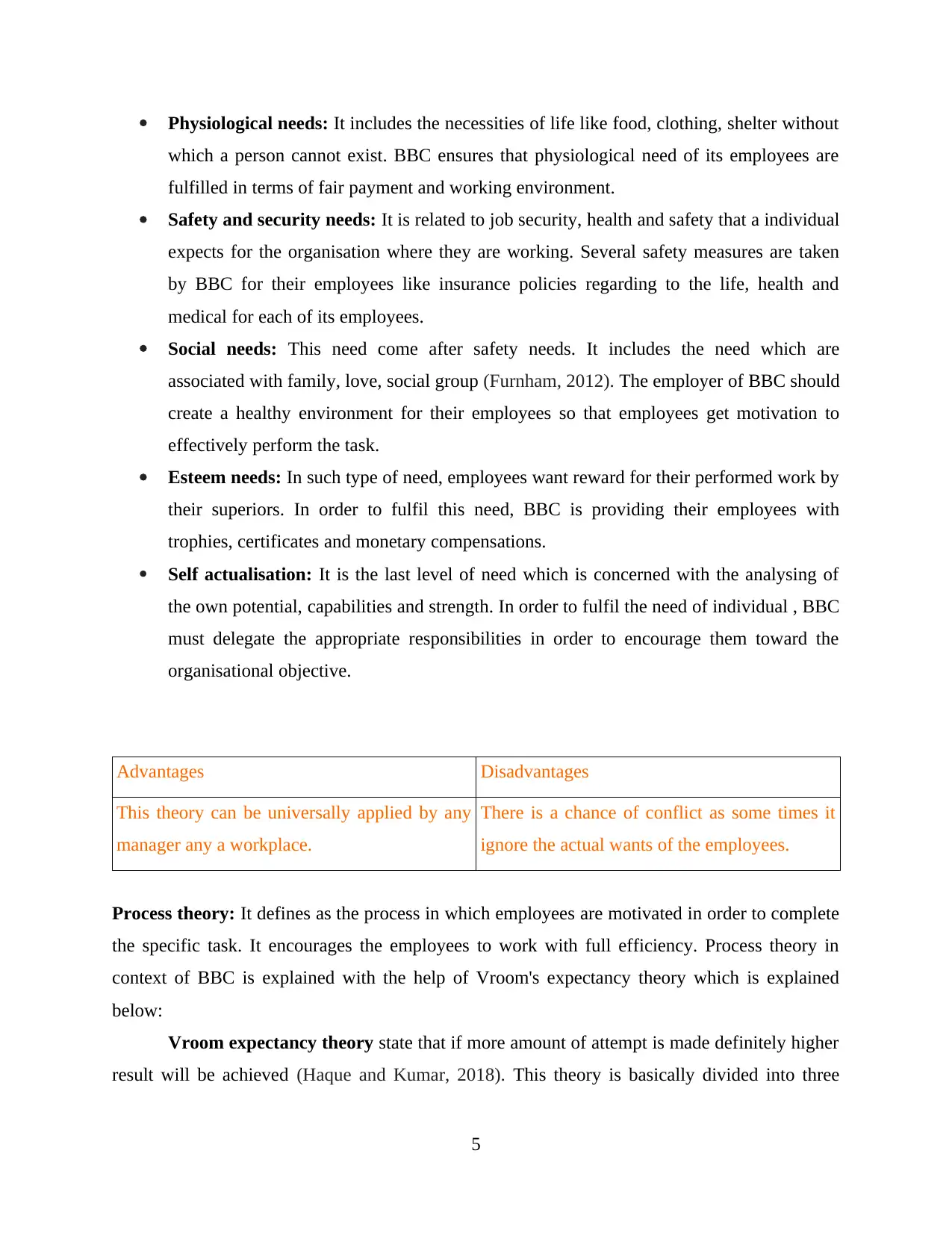
Physiological needs: It includes the necessities of life like food, clothing, shelter without
which a person cannot exist. BBC ensures that physiological need of its employees are
fulfilled in terms of fair payment and working environment.
Safety and security needs: It is related to job security, health and safety that a individual
expects for the organisation where they are working. Several safety measures are taken
by BBC for their employees like insurance policies regarding to the life, health and
medical for each of its employees.
Social needs: This need come after safety needs. It includes the need which are
associated with family, love, social group (Furnham, 2012). The employer of BBC should
create a healthy environment for their employees so that employees get motivation to
effectively perform the task.
Esteem needs: In such type of need, employees want reward for their performed work by
their superiors. In order to fulfil this need, BBC is providing their employees with
trophies, certificates and monetary compensations.
Self actualisation: It is the last level of need which is concerned with the analysing of
the own potential, capabilities and strength. In order to fulfil the need of individual , BBC
must delegate the appropriate responsibilities in order to encourage them toward the
organisational objective.
Advantages Disadvantages
This theory can be universally applied by any
manager any a workplace.
There is a chance of conflict as some times it
ignore the actual wants of the employees.
Process theory: It defines as the process in which employees are motivated in order to complete
the specific task. It encourages the employees to work with full efficiency. Process theory in
context of BBC is explained with the help of Vroom's expectancy theory which is explained
below:
Vroom expectancy theory state that if more amount of attempt is made definitely higher
result will be achieved (Haque and Kumar, 2018). This theory is basically divided into three
5
which a person cannot exist. BBC ensures that physiological need of its employees are
fulfilled in terms of fair payment and working environment.
Safety and security needs: It is related to job security, health and safety that a individual
expects for the organisation where they are working. Several safety measures are taken
by BBC for their employees like insurance policies regarding to the life, health and
medical for each of its employees.
Social needs: This need come after safety needs. It includes the need which are
associated with family, love, social group (Furnham, 2012). The employer of BBC should
create a healthy environment for their employees so that employees get motivation to
effectively perform the task.
Esteem needs: In such type of need, employees want reward for their performed work by
their superiors. In order to fulfil this need, BBC is providing their employees with
trophies, certificates and monetary compensations.
Self actualisation: It is the last level of need which is concerned with the analysing of
the own potential, capabilities and strength. In order to fulfil the need of individual , BBC
must delegate the appropriate responsibilities in order to encourage them toward the
organisational objective.
Advantages Disadvantages
This theory can be universally applied by any
manager any a workplace.
There is a chance of conflict as some times it
ignore the actual wants of the employees.
Process theory: It defines as the process in which employees are motivated in order to complete
the specific task. It encourages the employees to work with full efficiency. Process theory in
context of BBC is explained with the help of Vroom's expectancy theory which is explained
below:
Vroom expectancy theory state that if more amount of attempt is made definitely higher
result will be achieved (Haque and Kumar, 2018). This theory is basically divided into three
5
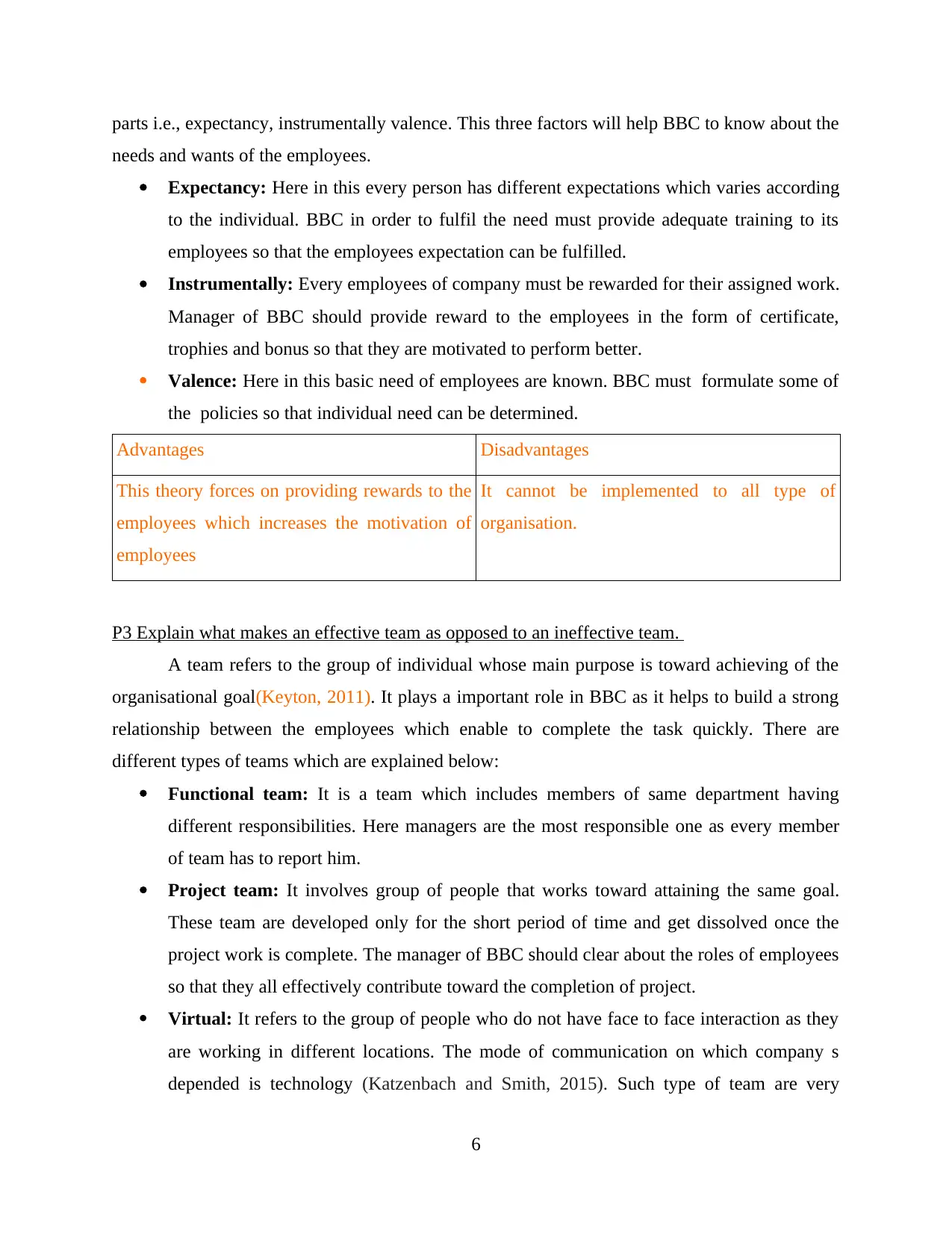
parts i.e., expectancy, instrumentally valence. This three factors will help BBC to know about the
needs and wants of the employees.
Expectancy: Here in this every person has different expectations which varies according
to the individual. BBC in order to fulfil the need must provide adequate training to its
employees so that the employees expectation can be fulfilled.
Instrumentally: Every employees of company must be rewarded for their assigned work.
Manager of BBC should provide reward to the employees in the form of certificate,
trophies and bonus so that they are motivated to perform better.
Valence: Here in this basic need of employees are known. BBC must formulate some of
the policies so that individual need can be determined.
Advantages Disadvantages
This theory forces on providing rewards to the
employees which increases the motivation of
employees
It cannot be implemented to all type of
organisation.
P3 Explain what makes an effective team as opposed to an ineffective team.
A team refers to the group of individual whose main purpose is toward achieving of the
organisational goal(Keyton, 2011). It plays a important role in BBC as it helps to build a strong
relationship between the employees which enable to complete the task quickly. There are
different types of teams which are explained below:
Functional team: It is a team which includes members of same department having
different responsibilities. Here managers are the most responsible one as every member
of team has to report him.
Project team: It involves group of people that works toward attaining the same goal.
These team are developed only for the short period of time and get dissolved once the
project work is complete. The manager of BBC should clear about the roles of employees
so that they all effectively contribute toward the completion of project.
Virtual: It refers to the group of people who do not have face to face interaction as they
are working in different locations. The mode of communication on which company s
depended is technology (Katzenbach and Smith, 2015). Such type of team are very
6
needs and wants of the employees.
Expectancy: Here in this every person has different expectations which varies according
to the individual. BBC in order to fulfil the need must provide adequate training to its
employees so that the employees expectation can be fulfilled.
Instrumentally: Every employees of company must be rewarded for their assigned work.
Manager of BBC should provide reward to the employees in the form of certificate,
trophies and bonus so that they are motivated to perform better.
Valence: Here in this basic need of employees are known. BBC must formulate some of
the policies so that individual need can be determined.
Advantages Disadvantages
This theory forces on providing rewards to the
employees which increases the motivation of
employees
It cannot be implemented to all type of
organisation.
P3 Explain what makes an effective team as opposed to an ineffective team.
A team refers to the group of individual whose main purpose is toward achieving of the
organisational goal(Keyton, 2011). It plays a important role in BBC as it helps to build a strong
relationship between the employees which enable to complete the task quickly. There are
different types of teams which are explained below:
Functional team: It is a team which includes members of same department having
different responsibilities. Here managers are the most responsible one as every member
of team has to report him.
Project team: It involves group of people that works toward attaining the same goal.
These team are developed only for the short period of time and get dissolved once the
project work is complete. The manager of BBC should clear about the roles of employees
so that they all effectively contribute toward the completion of project.
Virtual: It refers to the group of people who do not have face to face interaction as they
are working in different locations. The mode of communication on which company s
depended is technology (Katzenbach and Smith, 2015). Such type of team are very
6
⊘ This is a preview!⊘
Do you want full access?
Subscribe today to unlock all pages.

Trusted by 1+ million students worldwide
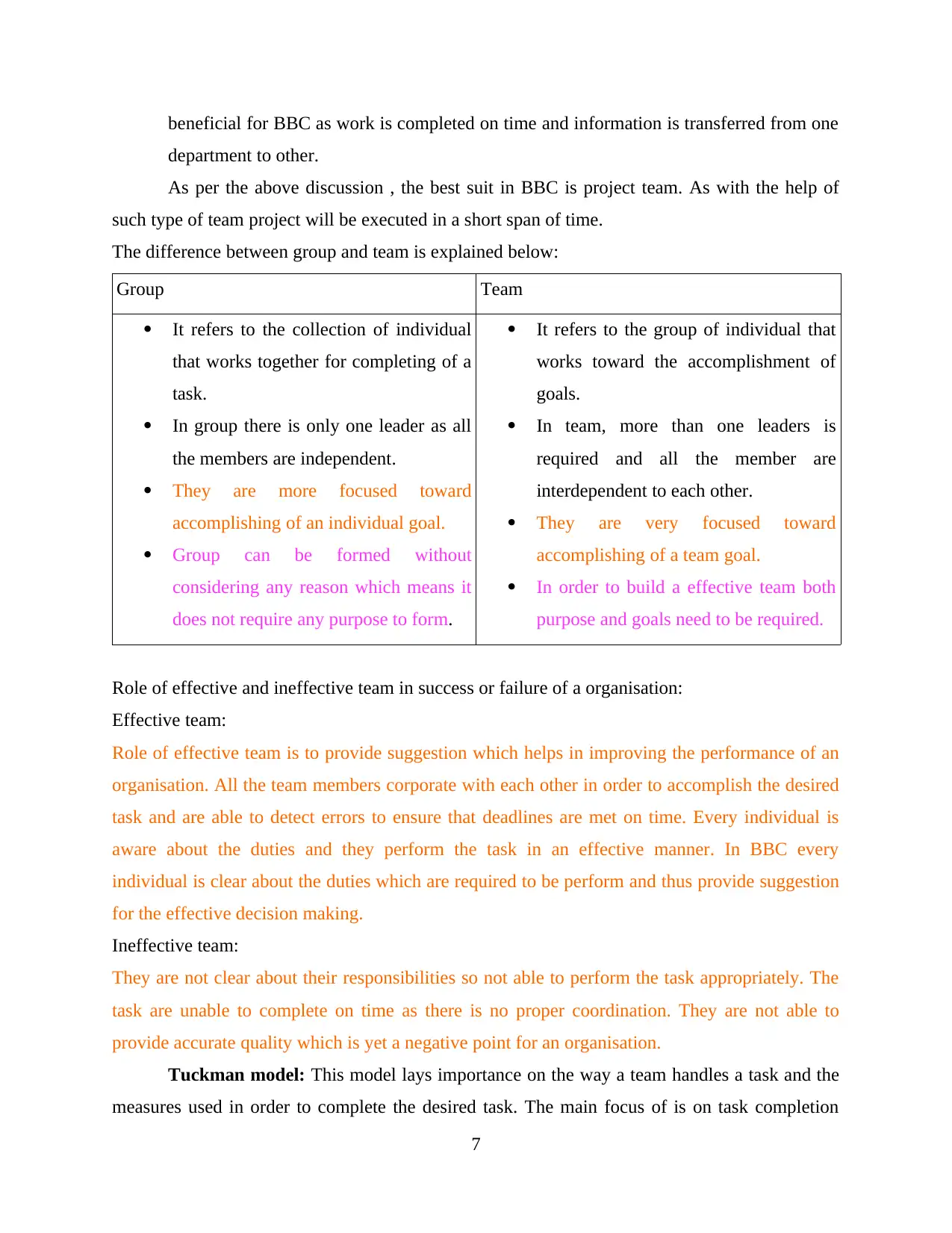
beneficial for BBC as work is completed on time and information is transferred from one
department to other.
As per the above discussion , the best suit in BBC is project team. As with the help of
such type of team project will be executed in a short span of time.
The difference between group and team is explained below:
Group Team
It refers to the collection of individual
that works together for completing of a
task.
In group there is only one leader as all
the members are independent.
They are more focused toward
accomplishing of an individual goal.
Group can be formed without
considering any reason which means it
does not require any purpose to form.
It refers to the group of individual that
works toward the accomplishment of
goals.
In team, more than one leaders is
required and all the member are
interdependent to each other.
They are very focused toward
accomplishing of a team goal.
In order to build a effective team both
purpose and goals need to be required.
Role of effective and ineffective team in success or failure of a organisation:
Effective team:
Role of effective team is to provide suggestion which helps in improving the performance of an
organisation. All the team members corporate with each other in order to accomplish the desired
task and are able to detect errors to ensure that deadlines are met on time. Every individual is
aware about the duties and they perform the task in an effective manner. In BBC every
individual is clear about the duties which are required to be perform and thus provide suggestion
for the effective decision making.
Ineffective team:
They are not clear about their responsibilities so not able to perform the task appropriately. The
task are unable to complete on time as there is no proper coordination. They are not able to
provide accurate quality which is yet a negative point for an organisation.
Tuckman model: This model lays importance on the way a team handles a task and the
measures used in order to complete the desired task. The main focus of is on task completion
7
department to other.
As per the above discussion , the best suit in BBC is project team. As with the help of
such type of team project will be executed in a short span of time.
The difference between group and team is explained below:
Group Team
It refers to the collection of individual
that works together for completing of a
task.
In group there is only one leader as all
the members are independent.
They are more focused toward
accomplishing of an individual goal.
Group can be formed without
considering any reason which means it
does not require any purpose to form.
It refers to the group of individual that
works toward the accomplishment of
goals.
In team, more than one leaders is
required and all the member are
interdependent to each other.
They are very focused toward
accomplishing of a team goal.
In order to build a effective team both
purpose and goals need to be required.
Role of effective and ineffective team in success or failure of a organisation:
Effective team:
Role of effective team is to provide suggestion which helps in improving the performance of an
organisation. All the team members corporate with each other in order to accomplish the desired
task and are able to detect errors to ensure that deadlines are met on time. Every individual is
aware about the duties and they perform the task in an effective manner. In BBC every
individual is clear about the duties which are required to be perform and thus provide suggestion
for the effective decision making.
Ineffective team:
They are not clear about their responsibilities so not able to perform the task appropriately. The
task are unable to complete on time as there is no proper coordination. They are not able to
provide accurate quality which is yet a negative point for an organisation.
Tuckman model: This model lays importance on the way a team handles a task and the
measures used in order to complete the desired task. The main focus of is on task completion
7
Paraphrase This Document
Need a fresh take? Get an instant paraphrase of this document with our AI Paraphraser
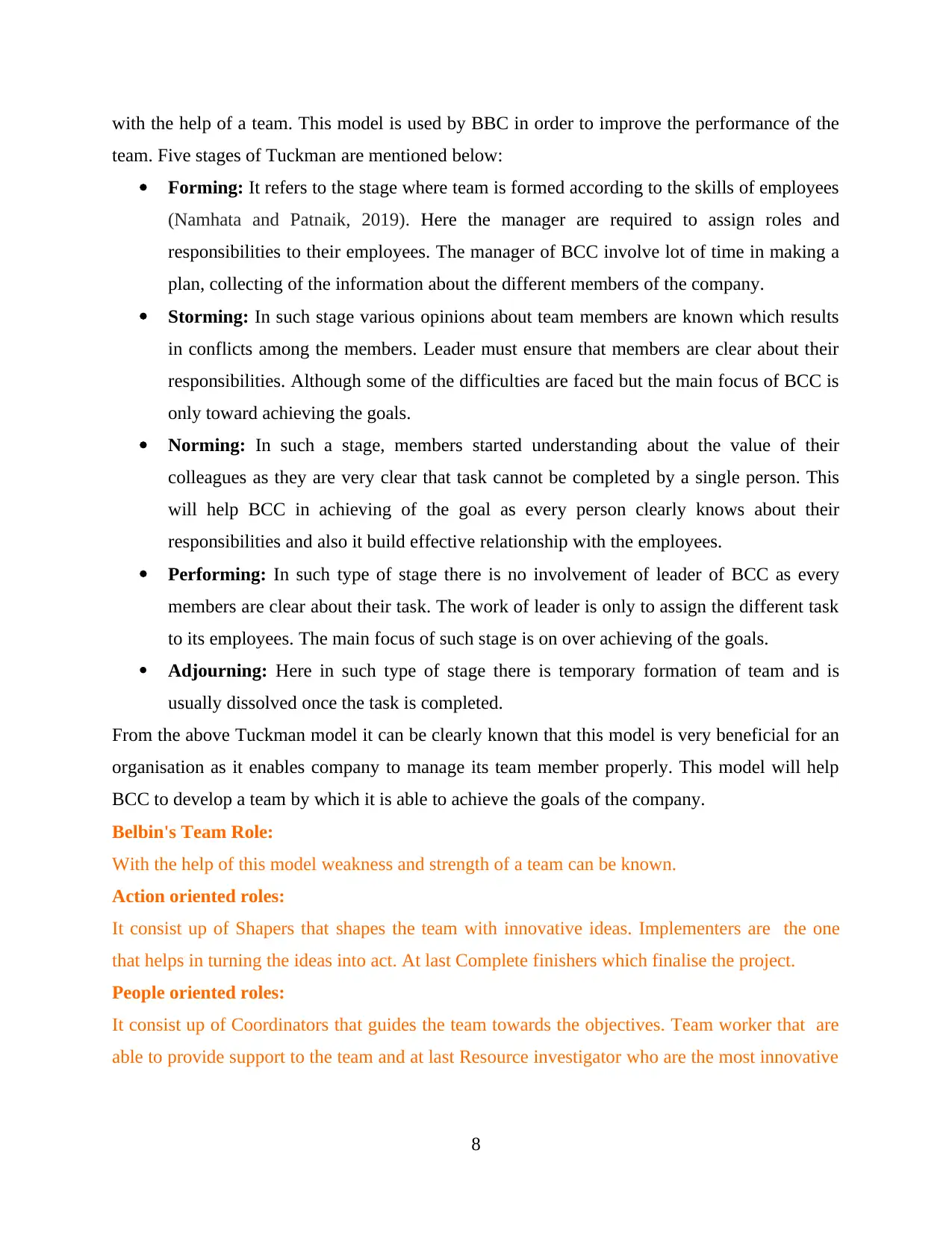
with the help of a team. This model is used by BBC in order to improve the performance of the
team. Five stages of Tuckman are mentioned below:
Forming: It refers to the stage where team is formed according to the skills of employees
(Namhata and Patnaik, 2019). Here the manager are required to assign roles and
responsibilities to their employees. The manager of BCC involve lot of time in making a
plan, collecting of the information about the different members of the company.
Storming: In such stage various opinions about team members are known which results
in conflicts among the members. Leader must ensure that members are clear about their
responsibilities. Although some of the difficulties are faced but the main focus of BCC is
only toward achieving the goals.
Norming: In such a stage, members started understanding about the value of their
colleagues as they are very clear that task cannot be completed by a single person. This
will help BCC in achieving of the goal as every person clearly knows about their
responsibilities and also it build effective relationship with the employees.
Performing: In such type of stage there is no involvement of leader of BCC as every
members are clear about their task. The work of leader is only to assign the different task
to its employees. The main focus of such stage is on over achieving of the goals.
Adjourning: Here in such type of stage there is temporary formation of team and is
usually dissolved once the task is completed.
From the above Tuckman model it can be clearly known that this model is very beneficial for an
organisation as it enables company to manage its team member properly. This model will help
BCC to develop a team by which it is able to achieve the goals of the company.
Belbin's Team Role:
With the help of this model weakness and strength of a team can be known.
Action oriented roles:
It consist up of Shapers that shapes the team with innovative ideas. Implementers are the one
that helps in turning the ideas into act. At last Complete finishers which finalise the project.
People oriented roles:
It consist up of Coordinators that guides the team towards the objectives. Team worker that are
able to provide support to the team and at last Resource investigator who are the most innovative
8
team. Five stages of Tuckman are mentioned below:
Forming: It refers to the stage where team is formed according to the skills of employees
(Namhata and Patnaik, 2019). Here the manager are required to assign roles and
responsibilities to their employees. The manager of BCC involve lot of time in making a
plan, collecting of the information about the different members of the company.
Storming: In such stage various opinions about team members are known which results
in conflicts among the members. Leader must ensure that members are clear about their
responsibilities. Although some of the difficulties are faced but the main focus of BCC is
only toward achieving the goals.
Norming: In such a stage, members started understanding about the value of their
colleagues as they are very clear that task cannot be completed by a single person. This
will help BCC in achieving of the goal as every person clearly knows about their
responsibilities and also it build effective relationship with the employees.
Performing: In such type of stage there is no involvement of leader of BCC as every
members are clear about their task. The work of leader is only to assign the different task
to its employees. The main focus of such stage is on over achieving of the goals.
Adjourning: Here in such type of stage there is temporary formation of team and is
usually dissolved once the task is completed.
From the above Tuckman model it can be clearly known that this model is very beneficial for an
organisation as it enables company to manage its team member properly. This model will help
BCC to develop a team by which it is able to achieve the goals of the company.
Belbin's Team Role:
With the help of this model weakness and strength of a team can be known.
Action oriented roles:
It consist up of Shapers that shapes the team with innovative ideas. Implementers are the one
that helps in turning the ideas into act. At last Complete finishers which finalise the project.
People oriented roles:
It consist up of Coordinators that guides the team towards the objectives. Team worker that are
able to provide support to the team and at last Resource investigator who are the most innovative
8
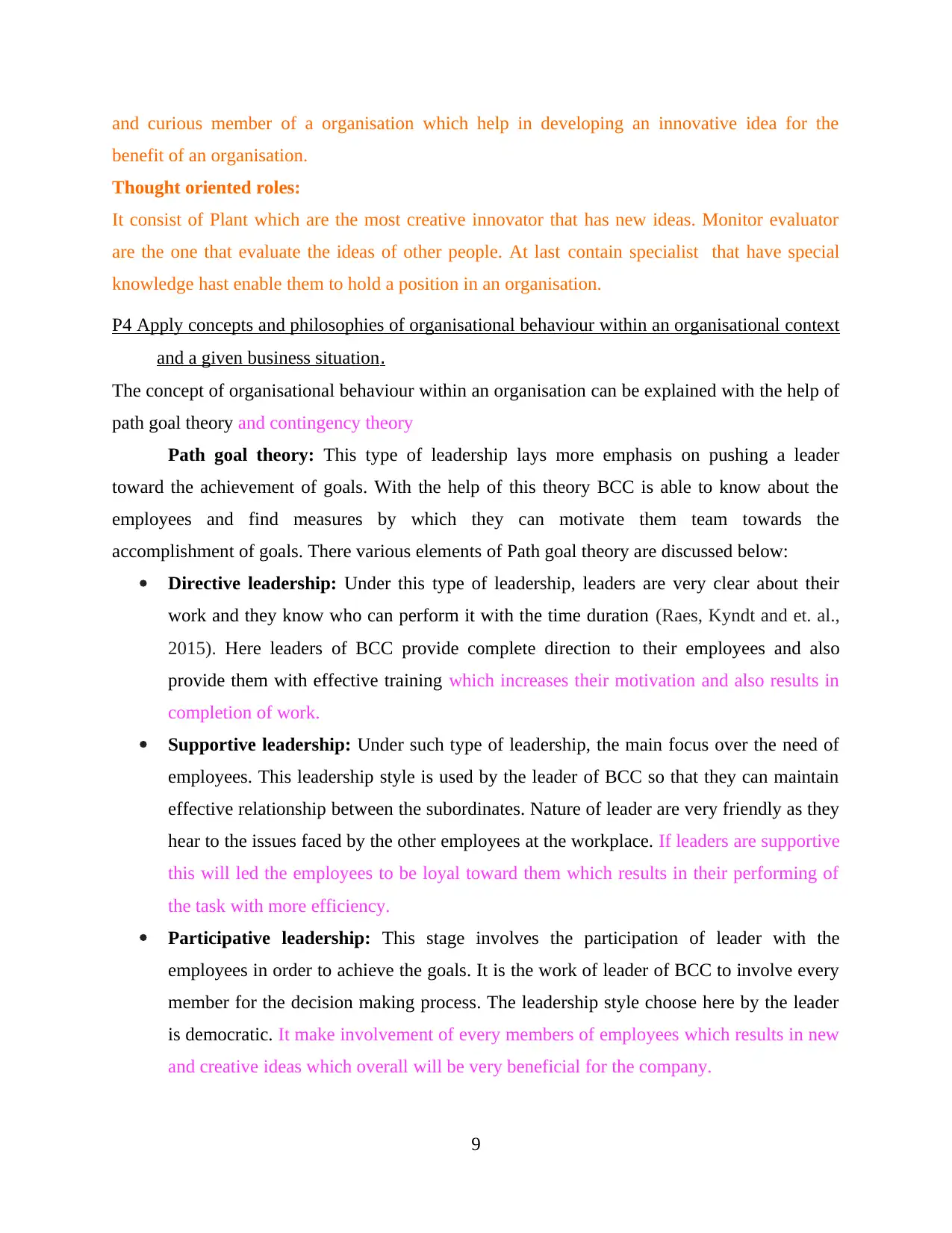
and curious member of a organisation which help in developing an innovative idea for the
benefit of an organisation.
Thought oriented roles:
It consist of Plant which are the most creative innovator that has new ideas. Monitor evaluator
are the one that evaluate the ideas of other people. At last contain specialist that have special
knowledge hast enable them to hold a position in an organisation.
P4 Apply concepts and philosophies of organisational behaviour within an organisational context
and a given business situation.
The concept of organisational behaviour within an organisation can be explained with the help of
path goal theory and contingency theory
Path goal theory: This type of leadership lays more emphasis on pushing a leader
toward the achievement of goals. With the help of this theory BCC is able to know about the
employees and find measures by which they can motivate them team towards the
accomplishment of goals. There various elements of Path goal theory are discussed below:
Directive leadership: Under this type of leadership, leaders are very clear about their
work and they know who can perform it with the time duration (Raes, Kyndt and et. al.,
2015). Here leaders of BCC provide complete direction to their employees and also
provide them with effective training which increases their motivation and also results in
completion of work.
Supportive leadership: Under such type of leadership, the main focus over the need of
employees. This leadership style is used by the leader of BCC so that they can maintain
effective relationship between the subordinates. Nature of leader are very friendly as they
hear to the issues faced by the other employees at the workplace. If leaders are supportive
this will led the employees to be loyal toward them which results in their performing of
the task with more efficiency.
Participative leadership: This stage involves the participation of leader with the
employees in order to achieve the goals. It is the work of leader of BCC to involve every
member for the decision making process. The leadership style choose here by the leader
is democratic. It make involvement of every members of employees which results in new
and creative ideas which overall will be very beneficial for the company.
9
benefit of an organisation.
Thought oriented roles:
It consist of Plant which are the most creative innovator that has new ideas. Monitor evaluator
are the one that evaluate the ideas of other people. At last contain specialist that have special
knowledge hast enable them to hold a position in an organisation.
P4 Apply concepts and philosophies of organisational behaviour within an organisational context
and a given business situation.
The concept of organisational behaviour within an organisation can be explained with the help of
path goal theory and contingency theory
Path goal theory: This type of leadership lays more emphasis on pushing a leader
toward the achievement of goals. With the help of this theory BCC is able to know about the
employees and find measures by which they can motivate them team towards the
accomplishment of goals. There various elements of Path goal theory are discussed below:
Directive leadership: Under this type of leadership, leaders are very clear about their
work and they know who can perform it with the time duration (Raes, Kyndt and et. al.,
2015). Here leaders of BCC provide complete direction to their employees and also
provide them with effective training which increases their motivation and also results in
completion of work.
Supportive leadership: Under such type of leadership, the main focus over the need of
employees. This leadership style is used by the leader of BCC so that they can maintain
effective relationship between the subordinates. Nature of leader are very friendly as they
hear to the issues faced by the other employees at the workplace. If leaders are supportive
this will led the employees to be loyal toward them which results in their performing of
the task with more efficiency.
Participative leadership: This stage involves the participation of leader with the
employees in order to achieve the goals. It is the work of leader of BCC to involve every
member for the decision making process. The leadership style choose here by the leader
is democratic. It make involvement of every members of employees which results in new
and creative ideas which overall will be very beneficial for the company.
9
⊘ This is a preview!⊘
Do you want full access?
Subscribe today to unlock all pages.

Trusted by 1+ million students worldwide
1 out of 15
Related Documents
Your All-in-One AI-Powered Toolkit for Academic Success.
+13062052269
info@desklib.com
Available 24*7 on WhatsApp / Email
![[object Object]](/_next/static/media/star-bottom.7253800d.svg)
Unlock your academic potential
Copyright © 2020–2026 A2Z Services. All Rights Reserved. Developed and managed by ZUCOL.





